Topics of Presentations-LPE
- 格式:doc
- 大小:31.50 KB
- 文档页数:2
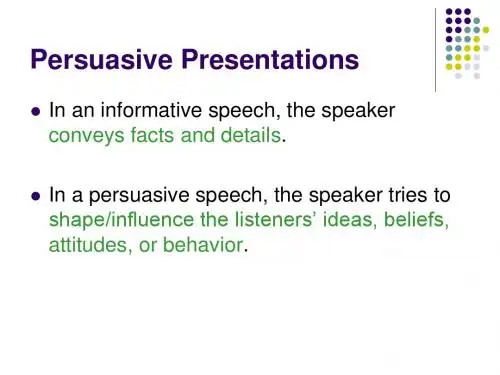


Hello, everyone! Today, I will talk about the effects of the 2008 Financial Crisis on China. The 2008 Financial Crisis raised by the US subprime mortgage crisis is regarded as the worst financial market dislocation since the great depression in 1930.The crisis had severe impacts on the global financial market as well as many countries in the world. Today, I will focus on the effects on China.I’ ve divided my presentation into 4 parts.1)First, I will analyze China’s position in the world economy2)Then I will introduce the real GDP Growth Rate in China during the crisis3)Finally, I will talk about how the crisis affected the China’s exports and imports growthNow, Let’s moving on to the first part, China’s position in the world economyFirst, as Li (2011) stated in his article, f rom 1978 to 2010, the share of China’s GDP in the world economy increased from 1.7% to 9.5%. The increasing weight of China in the world economy has helped contribute importantly to global growth.Then, let’s take a look at the second point. According to Morrison (2009), China’s net exports (exports minus imports) contributed to one-third of its GDP Growth in 2007. As a result, China overtook the United Stated to become the world’s 2nd largest merchandise exporter after the European Union.These are all the background information about the economy in China.Now, moving on to next slide, I will introduceThis world map shows the real GDP growth rate for 2009. As you can see from the label on the left of the map, the green areas meant that the GDP were above 0 percent, while the GDP in those brown areas were under 0 percent. It is very clear that the greenest area in the map was China, which meant that China maintained relatively high GDP Growth rate during the crisis, about 9 %.Looking at next slide, this graph illustrates the real GDP growth rate from 2008 to 2012. The red line stands for the China Real GDP while the Blue bars stand for the World Real GDP. Obviously, the GDP in China in this period was higher than the average GDP in the world.From the end of 2008 to the end of 2009, the average world Real GDP was under 0 percent. However, in this period, average GDP in China was still above 7%.Like the map before, this graph also shows that China had quite high GDP growth rate during the crisis.However, the crisis also brought negative effects to China, such as the exports and imports growth.Now, moving on to the last part.This line graph illustrates the exports and imports growth in China from 2006 to 2011. As you can see from the graph, before 2008, both exports and imports were above 10%. However, at the end of 2008, the year the crisis happened, both exports and imports began to decrease sharply. Especially in the first quarter of 2009, the imports rate had a sharp decline to almost -40%. At the mean time, in 2009, exports rate also reduced substantially to -20%. But after November 2009, both exports and imports rates in China started to rebound and had a quick increase to almost 60%.OK, Finally, I will give a brief conclusion about my presentation. First, I talked about China’s position in the world economy, especially for the changes of GDP and net exports. Then I gave detailed information about these two aspects in China during the crisis. Although the global financial crisis reduced foreign demand for China’s exports for the first time in many years, China has kept its relatively high growth rate during the crisis period. But why did the crisis have limited impacts on China? There are several reasons given by Li (2011). He argues that the key factor is China has strong financial position, which means that China could afford to generate substantial fiscal and credit expansion. When the crisis hit, the Chinese government took rapid measures to minimize the impact of the crisis. What’more, China’s high levels of foreign exchange reserves and limited international capital flow were also two reasons why the crisis only had limited impacts on China.。
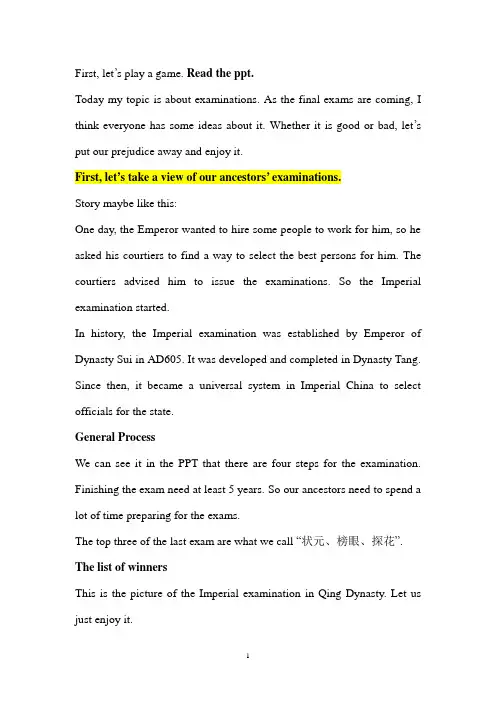
First, let’s play a game. Read the ppt.Today my topic is about examinations. As the final exams are coming, I think everyone has some ideas about it. Whether it is good or bad, let’s put our prejudice away and enjoy it.First, let’s take a view of our ancestors’ examinations.Story maybe like this:One day, the Emperor wanted to hire some people to work for him, so he asked his courtiers to find a way to select the best persons for him. The courtiers advised him to issue the examinations. So the Imperial examination started.In history, the Imperial examination was established by Emperor of Dynasty Sui in AD605. It was developed and completed in Dynasty Tang. Since then, it became a universal system in Imperial China to select officials for the state.General ProcessWe can see it in the PPT that there are four steps for the examination. Finishing the exam need at least 5 years. So our ancestors need to spend a lot of time preparing for the exams.The top three of the last exam are what we call “状元、榜眼、探花”. The list of winnersThis is the picture of the Imperial examination in Qing Dynasty. Let us just enjoy it.About the Imperial examinationThis system had a huge influence on both economy and culture to Imperial China.Neighboring Asian countries such as Japan, Vietnam and Korea also had similar systems, which were learned from China.But its disadvantages are obvious. For example,Limit people’s imaginationOnly focus on ability, but not moralitySpread the utilitarianism and bureaucracy……College Entrance ExamI think we must be very familiar with these pictures. Because all of us have taken College Entrance Exam before we enter university.When we talked about the college entrance examination, what we associated was “Black June,unfair, suffering, Test Machine, Tiring and exhausted”.To get a good mark, every examinee has to work hard to struggle. It is a really painful time, yet still has something meaningful and happy.At that time, everyday seems to be monotonous, but we seek joy amidst sorrow. Though we had a lot of homework and papers to do, we didn’t lose confidence. Even when some times we feel depressed, we tell ourselves “A fig for this! Just a few months on this”.SharingIn fact, when I now look back on those days, the feelings are complex, just as an old saying goes, if a person did not experience the college entrance examination, his life can not say completed. Recalling those days, with a faint hint of sadness and endless aftertaste, I really feel happy and proud.The Independent RecruitmentI think many of us may take part in last year’s Independent Recruitment. But have you heard the news about this year’s Independent Recruitment? There are three big groups this year. They are Tsinghua University Union, Peking University Union and Tongji University Union.However, it doesn’t seem to be warmly welcomed this year.Our clever Chinese netizens created two interesting names for those groups, “huayue and beiyue ”, to show their attitude to it. What’s more, there are some experts criticizing the three groups for their malicious competition.About The Independent RecruitmentThe original intention of the independent recruitment is to create more opportunities for students who have special ability but can’t be admitted to university in normal ways. But it now has become a game for some colleges to vie the outstanding students.In the U.S. Ivy League universities, candidates can enjoy the unlimited choices; they can apply for any college as they like.Universities in China have once had a high degree of self-enrollment and could give the candidate the full right to choose.So if today’s independent admission can think more for the examinees, rather than “fight” with each other, the independent recruitment then will really benefit China's education.。

如何更好地和欧美客户做Presentation我以前在做全球采购(Global sourcing)的时候,经常会参加采购部的会议。
在这些会议上,采购会邀请一些现有的或者是潜在的供应商,来我们公司总部做一些Presentation,供应商在会议上展示自家的厂房设备、管理团队、核心技术和产品。
对于供应商来说,这种展示会议是一个绝佳的机会,向我们的全球采购总监和经理们介绍自家的核心竞争力,巩固现有的供应地位,或为将来拿项目打好坚实的基础。
中国虽然是全球的制造中心,但是高端、高附加值的产业占比并不高,占主流的还是低附加值、劳动密集型的产品,而制造这些类型产品的又是以民营企业为主。
民营企业在短短的20-30年内迅速崛起,但是其商业文化底蕴还是比较薄弱的,其中的一个细节就体现在企业对待客户Presentation上面。
大多欧美企业的商业文化里都非常重视Presentation,这个单词本身就包含了很多的含义,在中文里可以翻译成演讲,展示,报告等等。
Presentation是一系列的内容和活动,其中包括主体内容的PowerPoint(PPT,幻灯片),演讲者的现场表达和参加会议者之间的互动。
外企高管人员无一不是这方面的专家里手,相反的,一些很有能力的人因为Presentation 技能的欠缺,或多或少地影响着他们在外企的发展之路。
我看过很多供应商的介绍会,经验不足的企业会在前期准备和临场发挥上都存在着一些问题,很难给客户留下一个深刻的印象。
有经验的企业则会抓住这种千载难逢的机会,通过细心的准备,尽力推广自己的产品。
当然,企业最核心的东西还是产品,广告做得再好,不如自家产品好。
我总结了很多供应商在做Presentation时的表现,汇总成为二种具有代表类型的公司。
A类公司简单的PowerPoint,缺乏亮点的内容这类型公司在做Presentation的时候,会做一个比较简易的PowerPoint,其中主要会包含以下内容:公司的发展史,过去几年的销售额增长趋势,组织结构图,各类生产设备,实验室设备,各类ISO/TS证书等等。
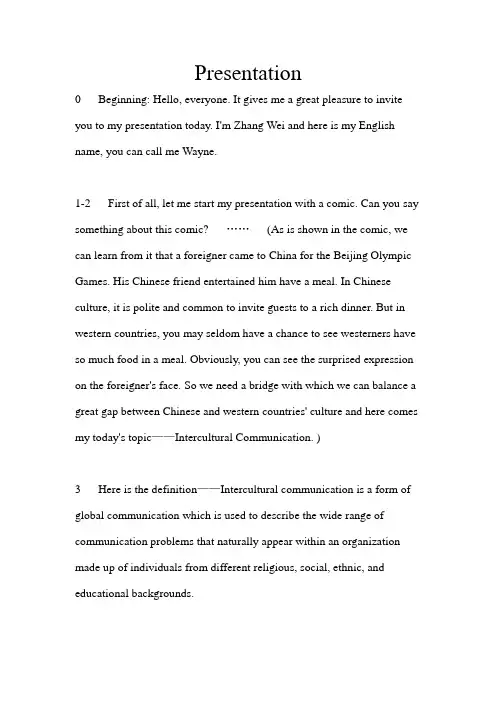
Presentation0 Beginning: Hello, everyone. It gives me a great pleasure to invite you to my presentation today. I'm Zhang Wei and here is my English name, you can call me Wayne.1-2 First of all, let me start my presentation with a comic. Can you say something about this comic? ……(As is shown in the comic, we can learn from it that a foreigner came to China for the Beijing Olympic Games. His Chinese friend entertained him have a meal. In Chinese culture, it is polite and common to invite guests to a rich dinner. But in western countries, you may seldom have a chance to see westerners have so much food in a meal. Obviously, you can see the surprised expression on the foreigner's face. So we need a bridge with which we can balance a great gap between Chinese and western countries' culture and here comes my today's topic——Intercultural Communication. )3 Here is the definition——Intercultural communication is a form of global communication which is used to describe the wide range of communication problems that naturally appear within an organization made up of individuals from different religious, social, ethnic, and educational backgrounds.4-5 Then comes my first question——Could you give any more examples about the different cultures between China and western countries? ……Next I'll show you 12 pictures about it.(1)The first picture is about the different ways of raising advice. Chinese usually raise their advice in a roundabout way while westerners come straight to the point.(2)The second picture is about the different ways of tackling problems. You can see Chinese usually avoid difficulties they will meet but westerners are willing to face a difficulty without any hesitation.(3)From the third picture we can learn that when westerners take a trip, they often use their eye to enjoy the beautiful scene in their trip. But what we Chinese do? We just take a photo aimlessly and quickly return to the coach.(4)(To be continued……)6 If we are exposed to a new environment, we may find it difficult to adapt ourselves because Westerners behave differently from us. Culture is like the water a fish swims in. Once we are suddenly transplanted abroad, we probably become 'like a fish out of water' We may suffer from a related disease——Cultural Shock.7 Here is the explanation of Cultural Shock. Cultural Shock is anexperience of anxiety,worries, displeasure etc. that arise when people enter a new cultural context. It includes four phases: Honeymoon phase, Negotiation phase, Adjustment phase and Mastery phase.8 Then my second question comes: How can we do to get over culture shock as quick as possible? ……(1) To get to know the people of the host country. For this purpose, we must, first of all, learn its language. When we are able to talk with the native of the natives of the host country, we will be confident and a whole new world of cultural meaning will open up for us.(2) Then we must try to find out the value and interest pattern of the native people. In this way, we can find it quite easy to get people to talk to us and be interest in us.(3) Thirdly, we can join the activities of the people, whether it is a carnival, a religious ritual, or some economic activity.9-10 Let's return to International Communication.We can divide it into two parts: culture and communication. You know culture is a set of shared perceptions followed by a large group of people. When we enter a strange environment we need communicate with local people and what we must pay close attention is nine ingredients of communication: Source, Encoding, Channel, Receiver, Decoding, Receiver Response, Feedbackand Noise. Encoding and decoding are of great significance to successful communication. For example,"U R a sexy girl"11 Ending: I think Intercultural Communication is a good way to know about different cultures around the world. Maybe it is not easy to adapt to a new environment. But as long as we have patience to overcome it. What we will gain is not only an enjoyment that a new environment will bring us, but also paving our way to success.。
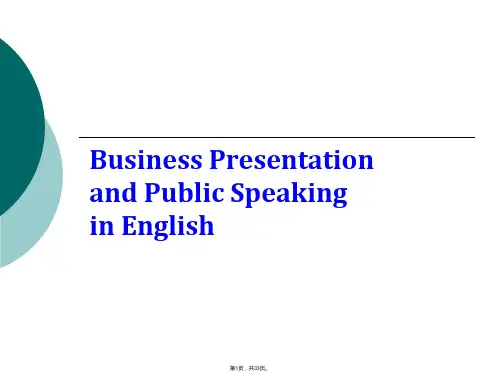

Obviously, traditional energy, such as coal and oil, which release energy by burning they can not satisfy people’s desire any more. Because natural resource is scarce, people can’t use traditional energy without limited. On the other hand, traditional energy has polluted environment as well, it will bring many problems, such as green house effect, create Ozone hole, because when burning fuel, there will release chemicals, like carbon dioxide. So, people have to exploit new energy which is clean, pollution-free, and renewable instead of traditional energy.太阳能(solar energy)The principle of solar energy is very easy to understand, it makes use of the solar panels to absorb solar energy, and then heat the water. Also, it can be used in solar cells which can convert the energy of sunlight into electric energy. Solar energy has really relieved energy crisis. It is clean and renewable energy which will not pollute environment and unlimited to use. However, it needs to invest large amount of money to support install the solar system. And the special material which can save and release solar energy is also expensive. Therefore, it is difficult for government to spread the application of solar energy in the whole country.风能(wind energy)From its name we can easily comprehend that the wind energy comes from the moving air. Like old fashioned windmills, today wind machines use blades to collect the wind kinetic energy. Windmills work because they slow down the speed of the wind. The wind flows over the airfoil shaped blades causing lift, like the effect on airplane wings, causing them to turn. The blades are connected to a drive shaft that turns an electric generator to produce electricity. The United States ranks third in the world in wind power capacity, behind Germany and Spain.All together, wind machines in the United States generate 17 billion kWh(kilo-watt hour) per year of electricity, enough to serve 1.6 million households. This is enough electricity to power a city the size of Chicago.氢能(hydrogen energy)Hydrogen energy as the most valuable secondary non-pollution, efficient renewable energy is attracting more and more attention.Hydrogen is the most abundant element in the earth and hydrogen has been recognized as an ideal alternative energy sources in the future because hydrogen is high energy density, non-polluting and storable. Hydrogen production from biomass can contribute not only to large-scale development and utilization of renewable energy, improve energy structure and reduce pollution as well as to meet people's demand for clean energy, but also is the most viable hydrogen production methods from renewable energy near the medium-term.地热能(geothermal energy)The geothermal energy, derived from the heat of the earth, plays an important role in human’s daily life.It is fabulous energy without pollution, Geothermal energy is natural heat from the interior of the Earth that is converted to heat buildings and generate electricity.As early as 1904, geothermal power was used in Italy. T oday, Earth’s natural internal heat is being used to generate electricity in 21 countries. T otal worldwide production is approaching 9,000 MW (million watt).。
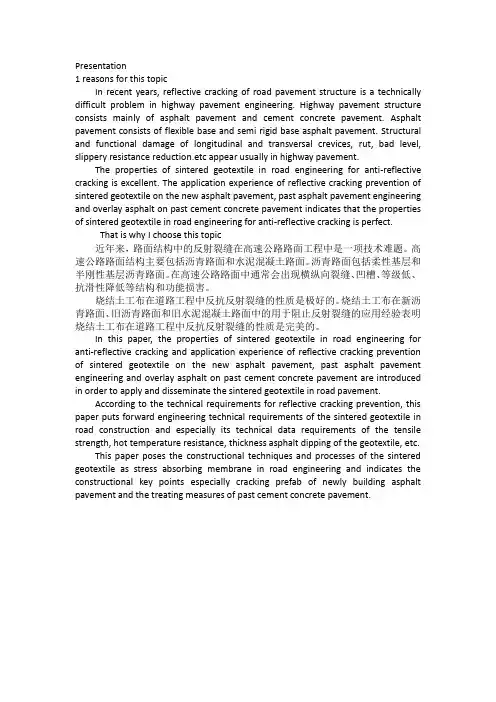
Presentation1 reasons for this topicIn recent years, reflective cracking of road pavement structure is a technically difficult problem in highway pavement engineering. Highway pavement structure consists mainly of asphalt pavement and cement concrete pavement. Asphalt pavement consists of flexible base and semi rigid base asphalt pavement. Structural and functional damage of longitudinal and transversal crevices, rut, bad level, slippery resistance reduction.etc appear usually in highway pavement.The properties of sintered geotextile in road engineering for anti-reflective cracking is excellent. The application experience of reflective cracking prevention of sintered geotextile on the new asphalt pavement, past asphalt pavement engineering and overlay asphalt on past cement concrete pavement indicates that the properties of sintered geotextile in road engineering for anti-reflective cracking is perfect.That is why I choose this topic近年来,路面结构中的反射裂缝在高速公路路面工程中是一项技术难题。
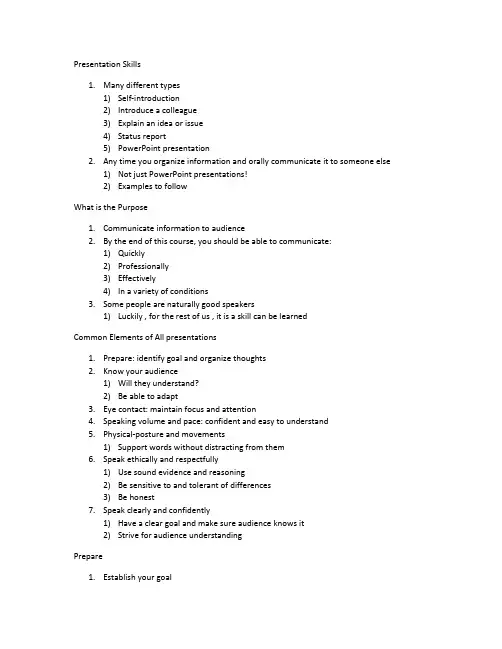
Presentation Skills 1. Many different types 1) Self-introduction 2) Introduce a colleague 3) Explain an idea or issue 4) Status report 5) PowerPoint presentation 2. Any time you organize information and orally communicate it to someone else 1) Not just PowerPoint presentations! 2) Examples to follow
What is the Purpose 1. Communicate information to audience 2. By the end of this course, you should be able to communicate: 1) Quickly 2) Professionally 3) Effectively 4) In a variety of conditions 3. Some people are naturally good speakers 1) Luckily , for the rest of us , it is a skill can be learned
Common Elements of All presentations 1. Prepare: identify goal and organize thoughts 2. Know your audience 1) Will they understand? 2) Be able to adapt 3. Eye contact: maintain focus and attention 4. Speaking volume and pace: confident and easy to understand 5. Physical-posture and movements 1) Support words without distracting from them 6. Speak ethically and respectfully 1) Use sound evidence and reasoning 2) Be sensitive to and tolerant of differences 3) Be honest 7. Speak clearly and confidently 1) Have a clear goal and make sure audience knows it 2) Strive for audience understanding

英语presentation范文As we all know, giving an English presentation can be a nerve-wracking experience for many people. Whether you are a student presenting in front of your classmates or a professional giving a presentation at work, it's important to be prepared and confident in your delivery. In this English presentation sample, we will explore the key components of a successful presentation and provide some tips on how to make your presentation engaging and effective.First and foremost, it's essential to start with a strong opening. This can be a thought-provoking question, a surprising statistic, or a compelling story. The goal is to grab the audience's attention and make them interested in what you have to say. Once you have their attention, it's important to clearly state the purpose of your presentation and what you hope to achieve by the end.Next, you'll want to organize your content in a logical and easy-to-follow manner. This may include using visual aids such as slides or handouts to support your main points. It's important to remember that your audience may have varying levels of English proficiency, so it's crucial to use clear and simple language. Avoid using jargon or complex vocabulary that may confuse your audience.In addition to the content of your presentation, your delivery is also key to engaging your audience. This includes using a confident and clear speaking voice, making eye contact, and using gestures to emphasize key points. It's also important to be mindful of your body language and posture, as this can convey confidence and authority.Another important aspect of a successful English presentation is engaging your audience. This can be done by asking questions, encouraging participation, and creating opportunities for discussion. It's important to be receptive to feedback and questions from your audience, as this can help create a more interactive and engaging experience.Finally, it's important to conclude your presentation with a strong closing. This can be a summary of your main points, a call to action, or a memorable quote. The goal is to leave your audience with a lasting impression and a clear understanding of the key takeaways from your presentation.In conclusion, giving an English presentation can be a challenging but rewarding experience. By following these tips and strategies, youcan create a successful and engaging presentation that effectively communicates your message to your audience. Remember to be prepared, confident, and engaging, and you'll be sure to deliver a presentation that leaves a lasting impact.。
1. What do you think of "higher pay and higher pressure; 'lower pay and lower pressure”?2. Distance makes hearts fonder. Do you believe it? Why or why not?3. Should colleges make foreign language requirement?4. Do Hollywood movies have a bad influence on the world?5. Should Age discrimination be made illegal in the workplace?6. Are the Olympic Games a waste of money?7. Should school students be required to wear a school uniform?8. Should the use of animals in sports and entertainment be banned?9. Playing team sports are more enjoyable than playing individual sports.10. The automobile is a better invention than the telephone.12. Life in a big city has more advantages than that in a small town.13. Comment on this: experience is more valuable than education.14. How do you understand “research university”? Give it a definition.15. Friendship needs to be nurtured.16. Rapid creation of new knowledgeincreases demand for lifelong learning opportunities.17. Self-discipline is more important than specialties in promoting one’s popularity.18. Balance between economy and environment should always be kept in building a sustainable economy.19. My favorite playwright/poet and his/her masterpiece.20. It’s time to abolish family planning in China.21. Publicizing private property of government officials is conducive to curbing corruption.22. Political leaders should not withhold information from the public.23. Public figures should share part of their privacy with the public.24. How to restrain young students from net bar indulgence?25. Someone says love is patient, love is kind. It has no envy, nor it boasts itself and it is never proud. It rejoices over the evil and is the truth seeker. Love protects, preserves and hopes for the positive aspect of life. What do you think?26. Should men do half housework?27. How do you think of Liu Xiang? Did you blame him for quitting in 2008 Olympics and praise him for excellence in 2009 National Games?28. What do you think is the most precious thing in life?29. Do you think Obama deserve the Nobel Peace Prize 2009?30. Which has more social effect on school children: school or home? Why?31. Do you like TV advertisements? Do you think there should be or should not be advertisements in the breaks of TV programs?32. Do you think it is effective for the government to encourage people to buy automobiles with small output volume in order to protect the environment?33. Why do you think the government setsa higher purchase tax on automobiles with output bigger than 2.0?34. What should be the priority task in China’s national development strategy, urban development or rural development?35. What makes a nation invincible (undefeatable) in the process of globalization?36. Should cloning be prohibited in human organ reproduction?37. Do you think women and men have the same perception of a healthy life?38. Thinking about your country habits, is there any historical change in how people eat?39. Are there any differences between people from cities and the countryside? What kind of differences?40. What rights would a child born as a genetic copy of another child have?41. What is fashion? Do you think fashion changes with economy?42. Can the values of a person change over time?43. Do you think the amount of TV programs will increase or decrease in the future?44. What should be the primary purpose of TV programs? Entertainment or education?45. How countryside is being affected by the city development?46. What are the tendencies of the population growth/spread in China?47. Why our musical taste is changing when we get older?48. What qualifications should be required to become a TV star?49. What is freedom? What should be the relation between freedom and discipline?50. Do you think that films on TV that include drinking, drug abuse or smoking should be banned?51. What do you think about teaching social subjects in schools?52. Some people say that mobile phone plays a major role in their professional life. Others say it plays a more important role in their personal life. What is your opinion?53. What are the differences between handmade things and mass production?54. Are there any changes in attitudes of young people towards older people?55. Are newspapers neutral in the way they report certain topics?56. Is nuclear power the best way to meet the ever-increasing energy needs of the planet, or do alternative energy sources provide a viable alternative?57. Is it morally acceptable toexperiment on non-human animals to develop products and medicines that benefit human beings?58. What is the difference between a relationship with a perceptive, responsive and emotionally sensitive robot and the relationships we develop on internet sites59. What is the possible time frame fora colony on the moon? What should it be used for?(注:可编辑下载,若有不当之处,请指正,谢谢!)。
教员著作的部分成果 内部教学使用 请勿上网与外传 ——财政与税务学院朱军博士
1
Topics of Presentation
要求:围绕主题进行讨论分析,形成完整的、逻辑体系专题小论文+PPT。每个
题目可以包括讨论话题,也可以根据自己对题干的理解,增加更多的话题。
第一题 地方财政基本问题
讨论话题1 什么是地方?
讨论话题2 地方财政理论基本问题
讨论话题3 地方财政实践问题
讨论话题4 财政法定主义原则与地方财政运行
第二题 地方分权与治理理论
讨论话题1 什么是“联邦”/“邦联”
讨论话题2 分权中的中央与地方
参考文献:[1] 林达.近距离看美国之一:历史深度的忧虑[M].北京:北京三联书店
出版社.2010.12.
[2] 林达.近距离看美国之二:总统是靠不住的[M].北京:北京三联书店出版
社.2010.12.
第三题 公共选择与地方财政问题
讨论话题1 地方政治生态
讨论话题2 选举与公共支出规模扩张
讨论话题3 选举与政府收入规模
——君子一言,绝不增税!
讨论话题4 地方财政压力问题
讨论话题5 地方财政纪律与财政责任
第四题 地方财政风险度量与控制
讨论话题1 地方财政风险评估
讨论话题2 地方财政风险信息披露
讨论话题3 地方财力评估与资本性支出预测
讨论话题4 地方财政评级问题
讨论话题5 外部冲击/特定危机与地方财政风险控制
第五题 政府间的财政关系
讨论话题1 横向转移支付问题
讨论话题2 生态转移支付问题
讨论话题3 特定项目的转移支付问题
第六题 财政资源地理分布与区域财政差异
讨论话题1 区域间财政差异的度量
讨论话题2 财政资源地理分布
讨论话题3 公共服务均等化与国家最低公共服务标准
教员著作的部分成果 内部教学使用 请勿上网与外传 ——财政与税务学院朱军博士
2
第七题 地方财政的再分配职能
讨论话题1 再分配性的地方税收
讨论话题1 再分配性的地方财政支出
第八题 地方财政预算工作与社会参与
讨论话题1 地方财政预算工作
讨论话题2 公民社会与地方财政
讨论话题3 信息化与公众参与
讨论话题4 《地方财政透明度守则》与《预算诚实法》
第九题 地方公共产品的私人提供
讨论话题1 地方公共产品的私人提供
讨论话题2 公共服务外包问题
讨论话题3 地方财政合同管理
第十题 空间、地区间的财政竞争
讨论话题1 辖区间财政竞争问题
讨论话题2 辖区间财政竞争的经济效应
讨论话题2 辖区间财政竞争的福利损失
第十一题 地方公共服务的质量评价
讨论话题1 地方公共服务的意愿表达与退出
讨论话题2 地方公共服务的绩效评价
讨论话题3 地方公共服务与居民生活提高
讨论话题4 地方支出结构与居民生活提高
第十二题 中国地方财政问题
讨论话题1 地方财政自主性问题
讨论话题2 地方财政风险问题
讨论话题3 地方税制体制建设
讨论话题4 地方财政支出规模及其控制
讨论话题5 统一体制与地方改革